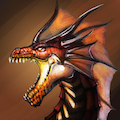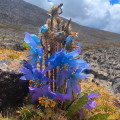#1 2009-02-12 20:25:46 | 只看该作者
- 银月龙
- 角龍

- Registered: 2008-12-14
- Posts: 465
虹蛇
Rainbow Serpent
The Rainbow Serpent (also known as the Rainbow Snake) is an important mythological being for Aboriginal people across Australia, although the creation myths associated with it are best known from northern Australia.
The Rainbow Serpent is seen as the inhabitant of permanent waterholes and is in control of life's most precious resource, water. He is the underlying Aboriginal mythology for the famous Outback "bunyip". He is the sometimes unpredictable Rainbow Serpent, who vies with the ever-reliable Sun, that replenishes the stores of water, forming gullies and deep channels as he slithered across the landscape, allowing for the collection and distribution of water.
Dreamtime stories tell of the great Spirits during creation, in animal and human form they molded the barren and featureless earth. The Rainbow Serpent came from beneath the ground and created huge ridges, mountains and gorges as it pushed upward. The Rainbow Serpent is known as Ngalyod by the Gunwinggu and Borlung by the Miali. He is a serpent of immense proportions which inhabits deep permanent waterholes.[1]
Serpent stories vary according to environmental differences. Tribes of the monsoonal areas depict an epic interaction of the Sun, Serpent and wind in their Dreamtime stories, whereas tribes of the central desert experience less drastic seasonal shifts and their stories reflect this.
It is known both as a benevolent protector of its people (the groups from the country around) and as a malevolent punisher of law breakers. The rainbow serpent's mythology is closely linked to land, water, life, social relationships and fertility.
There are innumerable names and stories associated with the serpent, all of which communicate the significance and power of this being within Aboriginal traditions.
The myth of the Rainbow serpent is sometimes associated with Wonambi naracoortensis, a large snake of the now extinct megafauna of Australia.
虹蛇在澳大利亞當地土著人神話中佔有很重要的成分。而這些傳說大部分是來自澳大利亞北部
虹蛇通常獨自佔有一個固定的池塘,這可以理解為它們支配着這種寶貴的資源:水源。虹蛇居住在在神話中非常有名的一塊大陸"bunyip"上。虹蛇的脾氣有時候不可捉摸,常和太陽一較高下(銀月:因為虹蛇也司雨水)。滿溢的池塘,大地上高低起伏的峽谷和谷地,就像虹蛇蜿蜒盤旋在大陸上,連接並分配着大地上的水源。
"夢的時代"這段傳說講述了這個偉大精靈創造萬物的事情,他按照動物和人類的身體構造和生活方式來塑造這片貧瘠且毫無生機的大地。虹蛇會蜿蜒在地下,一些巨型山脊、山脈和峽谷就是這麼形成的,就好像虹蛇從地下推它們似的。Gunwinggu人稱虹蛇為Ngalyod ,在Miali這個地方的人稱虹蛇為Borlung。虹蛇的身體巨大且均勻,棲息在一個固定的池塘中。
關於虹蛇的故事在不同環境下有不同的版本。在季風帶的部族的史詩文化中,那些關於太陽,虹蛇以及風的"夢的時代"的記載恰好反映了當地季節變化不明顯的沙漠氣候。
虹蛇被來自各地的人們看做是為他們帶來恩惠的保衛者,以及一些惡意破壞法規的人的懲罸者。虹蛇在神話中是大地、水源、生命、社會以及生命力的象徵。
無數的名字和故事都不約而同地聯繫到虹蛇身上,這些名字和故事都表明了虹蛇在部落傳統中的意義和權力。
神話中的虹蛇在現實中確有其物,通常認為虹蛇的原型是一種曾經生活在澳大利亞已經滅絶的叫做Wonambi naracoortensis的大型蛇。
最后修改: 银月龙 (2009-02-17 18:00:50)
离线
#2 2009-02-12 20:47:06 | 只看该作者
- 银月龙
- 角龍

- Registered: 2008-12-14
- Posts: 465
回应: 虹蛇
問個問題…… 為啥無法編輯標題呢……
補充:
Wonambi naracoortensis
Wonambi,動物界,脊索動物門,蜥形綱 ,有鱗目,蛇科,Madtsoiidae屬,Wonambi種。
是一種生活在更新世的動物,它的化石有五千五百萬年的歷史,而它在五萬年前就滅絶了。它常常埋伏在池塘裡襲擊來喝水止渴的袋鼠和其他的獵物。這種蛇是虹蛇的原型
离线
#3 2009-02-12 20:59:42 | 只看该作者
- 银月龙
- 角龍

- Registered: 2008-12-14
- Posts: 465
回应: 虹蛇
補充:夢的時代
澳大利亞的土著居民阿泊利基尼在五萬到六萬年前定居澳大利亞,靠狩獵和採集為生。那時候澳大利亞與東南亞還有陸地相連接,後來隨着海平面的上升,才逐漸與其他地區隔絶。
阿泊利基尼人把夢作為自己生活的規範加以重視,這種習慣是從被世界各國稱為”夢的世道“的古代繼承下來的。所謂”夢的時代“指的是創造天地的時代,是確定人、動物、地形、各種傳統和各類事物形狀的時代。因此阿泊利基尼人口傳下來的”夢的時代“民間傳說裡,說明他們身邊的事物的起源和原因的起源神話是很多的。
虹蛇就是從”夢的時代“起一直受到阿泊利基尼崇敬的、以大蛇姿態出現的偉大精靈的體現。
雖然都是”夢的時代“傳承,但記載的內容有明顯的地域性。不過,不論在哪個傳說中,虹蛇都是有深遠的睿智和無限的審理的偉大精靈的象徵。發出彩虹般光芒的、身材巨大而美麗的大蛇,在”夢的時代“和其他圖騰生物一起,給平坦的世界勾畫出各種各樣的地圖。有峽谷,有高山,有谷底,還有蛇一般蜿蜒曲折的江河。他們相信,這都是虹蛇爬行的痕跡。
在乾旱的澳大利亞,旱季之後的雨水是孕育生命不可缺少的,可以說是上天惠顧人類的雨水。支配水源的虹蛇同時也支配着閃電、彩虹、雨水、雲彩等天象,因此是創造生命和重生的力量的象徵。虹蛇有時是生産萬物的偉大的母親,有時是偉大母親的配偶即偉大的父親,都倍受崇敬。
虹蛇的形象在澳大利亞各地的壁畫裡都有描繪和雕刻,很容易找到。阿泊利基尼的神聖舞蹈都是用來祭祀虹蛇的,作為寶物裝飾的寶石也據說是虹蛇的蛋。
銀月:阿泊利基尼在當地語言中的含義就是虹蛇。
最后修改: 银月龙 (2009-02-12 21:01:27)
离线
#4 2009-02-12 23:28:10 | 只看该作者
- shiningdracon
- 寻道龙

- Registered: 2008-11-03
- Posts: 4,346
回应: 虹蛇
澳大利亞的虹蛇實在是多,Yurlunggur、Wollunqua也都是虹蛇。同時,這些名字也都被用來命名真實存在的古代巨蛇:Several madtsoiid genera have been named using indigenous words for legendary Rainbow Serpents or dragons, including Wonambi (Pitjantjatjara), Yurlunggur (Yolngu) and Nanowana (Ancient Greek nano-, 'dwarf' + Warlpiri Wana) in Australia, and Herensugea (Basque) in Europe.
以龍為本
<-- 目前頭像 by 理業化肥
聯繫方式:站內短消息或郵件
离线
#5 2009-02-16 21:54:53 | 只看该作者
- 银月龙
- 角龍

- Registered: 2008-12-14
- Posts: 465
回应: 虹蛇

离线
#6 2009-02-17 18:00:14 | 只看该作者
- 银月龙
- 角龍

- Registered: 2008-12-14
- Posts: 465
回应: 虹蛇
更正2處翻譯錯誤
离线
#7 2009-02-17 21:04:40 | 只看该作者
- 银月龙
- 角龍

- Registered: 2008-12-14
- Posts: 465
回应: 虹蛇
繼續
Julunggul - goddess of Aborigines. Eternally pregnant, she vomits and produces Sisters of Dreamtime. While she is noted as female, she could trasform herself into a male or back into a female whensoever she pleased. As a symbol of manhood initition, she was obviously an important goddess. Other names include: Mumuna, Kalwadi, and Kungpipi.
Julunggul,阿泊利基尼神話中的女神。那是一次不朽的孕育,她吐出了Sisters of Dreamtime(銀月:我懷疑是那對被吃下的姐妹)她平常是雌性的,不過她在高興的時候可以隨時改變她的性別。她是成人禮節的標誌,顯然可以看出她是位極其重要的女神。她的其他的名字還有Mumuna, Kalwadi, and Kungpipi等。
In Aboriginal mythology, the Djanggawul are three siblings, two female and one male, who created the landscape of Australia and covered it with flora. They came from the underworld, Beralku, and were eventually eaten by Galeru.
The two female Djanggawul made the world's sacred talismans by breaking off pieces of their vulvas. They included Bunbulama, a rain goddess.
A possible source that includes the "Djanggawaul Song Cycle," partially available (with other links) on google books:
在阿泊利基尼神話中,Djanggawul是三兄妹,兩位女性和一位男性,他們創造了澳大利亞這片大陸,並將其隱蔽在植物叢中。他們來自地獄,Beralku,最後被Galeru所吃掉。
其中的兩位女性刺破她們的陰戶,製作了世界上最神聖的護符。她們當中有一位是雨之女神Bunbulama。
這些很可能是來源於“Djanggawaul組歌”節選的內容。來自google book。
下面這些是這本書的信息,不翻譯了。
Djanggawul: An Aboriginal Religious Cult Of North-eastern Arnhem Land
Berndt, Ronald Murray
London, Routledge: 2004 (first published 1952)
Galeru - swallowed the Djanggawul in order to demonstrate the "maintenance of life". She was a giant, rainbow serpent, too. (Found basically in Arnhemland beliefs.)2
Galeru吞下Djanggawul,她用這一行動來證明了她是“生命的保衛者”她是一位巨人,也有一種說法她是一條虹蛇。這個說法來自Arnhem land當地的信仰。
銀月:阿納姆地(Arnhem Land)位於澳大利亞北海岸綫的中部地區,並與卡卡杜國家公園, Arafura海,以及Carpentaria海灣接壤。
In Yoruba mythology, Oshunmare (also Oshumare, Oxumare) is a rainbow serpent, both male and female, and is a symbol of regeneration and rebirth.
在非洲的約魯巴神話中,Oshunmare (也寫作 Oshumare, Oxumare)是一條虹蛇,它有雄性也有雌性(銀月:還是雌雄同體?)是新生和重生的象徵。
最后修改: 银月龙 (2009-02-17 21:07:11)
离线
#8 2009-02-17 21:34:41 | 只看该作者
- 银月龙
- 角龍

- Registered: 2008-12-14
- Posts: 465
回应: 虹蛇
Aido Hwedo / Dan Ayido Hwedo
Folkore of the Dahomey in West Africa
History: This creature helped to create the universe by transporting Mawu, a god, through the cosmos. Aido Hwedo also created the mountains of the earth as well, which were said to be its excrement. However, the Earth became far too heavy, so the god Mawu ordered the Rainbow Serpent to coil underneath the world to hold it up. In order to help Aido Hwedo, the oceans were created to comfort the dragon while it held up the world. However, the oceans would sometimes not help, and therefore this dragon would tremble and thus make the Earth quake.6
In order to remain strong, it is said that Aido Hwedo needed a great amount of iron, and there would sometimes not be enough. When this happens, it is said that Aido Hwedo would eat its own tail. Thus the problem comes: the iron, supplied by the ocean for Aido Hwedo, would someday give out. When it does, this mighty dragon would eat its own tail, and the world, unable to support itself, would slip into the oceans.
Symbolism: In a sense, Aido Hwedo is seen as both a creator and a supporter of the world. The end of the world, as predicted in this folkore, is said also to be the weakness of this giant serpent - the shear mass of Aido Hwedo can not be maintained. Therefore, Aido Hwedo can be seen as a symbol of eternity and rebirth, much as any Ouroboros.
Physical Description: Aido Hwedo was said to be a vast rainbow serpent, so vast that it could hold up the entire world.
來自西非達荷美共和國的民間傳說
傳說故事: Aido Hwedo馱着Mawu並幫助他創造世界。據說Aido Hwedo的糞便變成大地上的山脈。然而,這個世界變得越來越沉重,所以創世神Mawu命令Aido Hwedo這條虹蛇蜷在世界下並將世界托起。為了幫助托着世界的Aido Hwedo,讓它感覺更舒服一些,Mawu創造了海洋。然而,有時候海洋也不能令它舒服,每當Aido Hwedo移動自己的身體時,地震便發生了。
為了保證它有足夠的力量(托起世界),據說Aido Hwedo需要極其大量的鐵,而它所接收到的通常不能滿足它的需求。據說當它感到饑餓(需要攝入鐵的時候),它就會吞吃自己的尾巴。然而這個問題一直沒有解決,供給Aido Hwedo的鐵常常被用盡。於是Aido Hwedo在沒有鐵可攝入的時候,它會吃自己的尾巴甚至是世界,然而這依然不能滿足它,於是他滑落到了海洋中。
象徵意義:某種意義上來說,Aido Hwedo同時被視為世界的創造者和支撐世界的虹蛇。民間傳說中預言:在世界的盡頭,依然可以看到這條虛弱的大蛇,它的身體已經支離破碎而且已經不能繼續維持它自己的生命了。因此,Aido Hwedo也被視作永恆以及新生的象徵,就像那條Ouroboros(含尾蛇)
形態描述:Aido Hwedo是一條極其巨大的虹蛇,它巨大到可以支撐整個世界。
http://en.wikipedia.org/wiki/Mahu
哦賣糕的,出交通事故了
http://yinglong.org/pedia/pedia/Aido-Hwedo.html
最后修改: 银月龙 (2009-02-18 10:06:57)
离线
#9 2009-02-17 21:41:02 | 只看该作者
- 银月龙
- 角龍

- Registered: 2008-12-14
- Posts: 465
离线
#10 2009-02-18 14:34:48 | 只看该作者
- shiningdracon
- 寻道龙

- Registered: 2008-11-03
- Posts: 4,346
回应: 虹蛇
關於Aido Hwedo:
the iron, supplied by the ocean for Aido Hwedo, would someday give out. When it does, this mighty dragon would eat its own tail, and the world, unable to support itself, would slip into the oceans.
這段英文描述的很不清楚。根據其他資料,這句應該理解為:當鐵被吃完時,Aido Hwedo就會吃自己的尾巴,這樣他就沒辦法再支撐世界,大地將翻到海里去。(世界毀滅)
http://www.squidoo.com/aido
http://www.theserenedragon.net/Tales/dahomey-aidohwedo.html
http://dracopedia.wikispaces.com/Aido-Hwedo
http://en.wikipedia.org/wiki/Aido_Wedo
以龍為本
<-- 目前頭像 by 理業化肥
聯繫方式:站內短消息或郵件
离线
#11 2009-02-19 10:16:20 | 只看该作者
- shiningdracon
- 寻道龙

- Registered: 2008-11-03
- Posts: 4,346
回应: 虹蛇
繼續
Julunggul,阿泊利基尼神話中的女神。那是一次不朽的孕育,她吐出了Sisters of Dreamtime(銀月:我懷疑是那對被吃下的姐妹)她平常是雌性的,不過她在高興的時候可以隨時改變她的性別。她是成人禮節的標誌,顯然可以看出她是位極其重要的女神。她的其他的名字還有Mumuna, Kalwadi, and Kungpipi等。
Julunggul 和 Yurlunggur 的發音這麼相像,是不是同一隻呢?
看來還真是:http://en.wikipedia.org/wiki/Julunggul
Another name for this deity, Yurlunggur, is also the name of an extinct genus of madtsoiid snakes (Yurlunngur), specifically named after the Aboriginal myth.
找到一篇容易理解的:http://www.goddessaday.com/polynesian/julunggul
Julunggul是澳大利亞原住民神話中掌管雨、水、與成年儀式的神明。她是‘夢的時代’的一條巨大虹蛇,在人類到達這片土地前就已存在。Julunggul有時是男性有時是女性,是她創造了所有的河流,居住在一個很深的水潭底。一天,Wawalag姐妹在她居住的水潭邊宿營,不小心將一些經血流進水中。Julunggul暴怒地衝出泉水,水像雨一樣從她身上落下。她吞了兩姐妹,但後來又吐了出來。
在男孩的成年儀式上有召喚Julunggul的習俗,要求她將男孩們吞下,之後再將他們吐出來,這時男孩們就不再是孩子,而是成年男子。蛇被作為再生的象徵已有很長的歷史,蛇蛻皮被視為脫離舊世,擁抱新生。Julunggul擁有許多別名:Yurlunggur, Ungur, Wonungur, Galeru, Worombi, Langal, Muit。
最后修改: shiningdracon (2009-02-19 11:22:46)
有 1 位朋友喜欢这篇文章:Raventhorn
以龍為本
<-- 目前頭像 by 理業化肥
聯繫方式:站內短消息或郵件
离线
#12 2009-02-19 15:49:07 | 只看该作者
- shiningdracon
- 寻道龙

- Registered: 2008-11-03
- Posts: 4,346
回应: 虹蛇
In Yoruba mythology, Oshunmare (also Oshumare, Oxumare) is a rainbow serpent, both male and female, and is a symbol of regeneration and rebirth.
在非洲的約魯巴神話中,Oshunmare (也寫作 Oshumare, Oxumare)是一條虹蛇,它有雄性也有雌性(銀月:還是雌雄同體?)是新生和重生的象徵。
根據其他虹蛇的描述推斷,我猜是雌雄同體,既是雄性也是雌性。
以龍為本
<-- 目前頭像 by 理業化肥
聯繫方式:站內短消息或郵件
离线
#13 2022-12-18 20:39:40 | 只看该作者
#14 2024-11-09 07:57:12 | 只看该作者
- Lunamis午月
- 虬龍

- Registered: 2022-08-30
- Posts: 137
回应: 虹蛇
@銀月龍 寫道: 補充:Wonambi naracoortensisWonambi,動物界,脊索動物門,蜥形綱 ,有鱗目,蛇科,Madtsoiidae屬,Wonambi種。是一種生活在更新世的動物,它的化石有五千五百萬年的歷史,而它在五萬年前就滅絕了。它常常埋伏在池塘裏襲擊來喝水止渴的袋鼠和其他的獵物。這種蛇是虹蛇的原型
這裏我做了修改,科是Madtsoiidae,屬則是Wonambi,種加詞纔是naracoortensis。吐槽一下蛇科是啥啊……蛇的分類單元就算用傳統分類法也應該是亞目而不是科。
有 1 位朋友喜欢这篇文章:Raventhorn
正在通往漫長背脊的修行之路上
离线
 爪機版
爪機版 龙有、龙治、龙享
龙有、龙治、龙享![[被雷]](/forum/img/smilies/haku/haku-shock.svg) 怪不得澳洲的生態平衡會這樣!
怪不得澳洲的生態平衡會這樣!